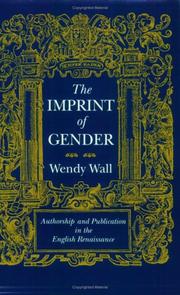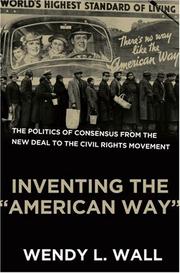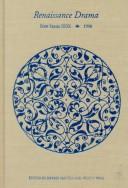| Listing 1 - 10 of 19 | << page >> |
Sort by
|

ISBN: 0521808499 Year: 2002 Publisher: Cambridge Cambridge University Press
Abstract | Keywords | Export | Availability | Bookmark
 Loading...
Loading...Choose an application
- Reference Manager
- EndNote
- RefWorks (Direct export to RefWorks)
English literature --- Thematology --- Drama --- anno 1600-1699 --- anno 1500-1599 --- Cooking in literature. --- Domestic drama, English --- English drama --- Gastronomy in literature. --- Home in literature. --- Housekeeping in literature. --- Women in literature. --- History and criticism.
Book
ISBN: 9780812247589 9780812224528 Year: 2016 Publisher: Philadelphia, Pa University of Pennsylvania Press
Abstract | Keywords | Export | Availability | Bookmark
 Loading...
Loading...Choose an application
- Reference Manager
- EndNote
- RefWorks (Direct export to RefWorks)
For a significant part of the early modern period, England was the most active site of recipe publication in Europe and the only country in which recipes were explicitly addressed to housewives. Recipes for Thought analyzes, for the first time, the full range of English manuscript and printed recipe collections produced over the course of two centuries.Recipes reveal much more than the history of puddings and pies: they expose the unexpectedly therapeutic, literate, and experimental culture of the English kitchen. Wendy Wall explores ways that recipe writing—like poetry and artisanal culture—wrestled with the physical and metaphysical puzzles at the center of both traditional humanistic and emerging "scientific" cultures. Drawing on the works of Shakespeare, Spenser, Jonson, and others to interpret a reputedly "unlearned" form of literature, she demonstrates that people from across the social spectrum concocted poetic exercises of wit, experimented with unusual and sometimes edible forms of literacy, and tested theories of knowledge as they wrote about healing and baking. Recipe exchange, we discover, invited early modern housewives to contemplate the complex components of being a Renaissance "maker" and thus to reflect on lofty concepts such as figuration, natural philosophy, national identity, status, mortality, memory, epistemology, truth-telling, and matter itself. Kitchen work, recipes tell us, engaged vital creative and intellectual labors.
History of civilization --- anno 1600-1699 --- anno 1500-1599 --- Great Britain --- Food writing --- Cooking, English --- Formulas, recipes, etc. --- Medicine --- Knowledge, Sociology of --- Renaissance --- History --- Formulae, receipts, prescriptions --- History.

ISBN: 0801480477 Year: 1993 Publisher: Ithaca, N.Y. Cornell University Press
Abstract | Keywords | Export | Availability | Bookmark
 Loading...
Loading...Choose an application
- Reference Manager
- EndNote
- RefWorks (Direct export to RefWorks)
Authority in literature --- Authors and publishers --- Authorship --- English literature --- Literature publishing --- Renaissance --- Women and literature --- 655.5 --- 820 "15/16" --- 82:655.5 --- 82:655.5 Literatuur en uitgeverij. Literatuur en boekhandel --- Literatuur en uitgeverij. Literatuur en boekhandel --- 820 "15/16" Engelse literatuur--?"15/16" --- Engelse literatuur--?"15/16" --- Literary publishing --- Literature --- Publishers and publishing --- Authoring (Authorship) --- Writing (Authorship) --- Author and publisher --- Publishers and authors --- Publishing contracts --- Contracts --- Book proposals --- Copyright --- Literary agents --- History --- Sex differences --- History and criticism --- Diverse onderwerpen met betrekking tot uitgeverij en boekhandel --- Publishing --- Law and legislation --- Book history --- anno 1500-1599 --- anno 1600-1699
Book
ISBN: 9780812291957 0812291956 9780812247589 0812224523 0812247582 Year: 2015 Publisher: Philadelphia
Abstract | Keywords | Export | Availability | Bookmark
 Loading...
Loading...Choose an application
- Reference Manager
- EndNote
- RefWorks (Direct export to RefWorks)
For a significant part of the early modern period, England was the most active site of recipe publication in Europe and the only country in which recipes were explicitly addressed to housewives. Recipes for Thought analyzes, for the first time, the full range of English manuscript and printed recipe collections produced over the course of two centuries. Recipes reveal much more than the history of puddings and pies: they expose the unexpectedly therapeutic, literate, and experimental culture of the English kitchen. Wendy Wall explores ways that recipe writing--like poetry and artisanal culture--wrestled with the physical and metaphysical puzzles at the center of both traditional humanistic and emerging "scientific" cultures. Drawing on the works of Shakespeare, Spenser, Jonson, and others to interpret a reputedly "unlearned" form of literature, she demonstrates that people from across the social spectrum concocted poetic exercises of wit, experimented with unusual and sometimes edible forms of literacy, and tested theories of knowledge as they wrote about healing and baking. Recipe exchange, we discover, invited early modern housewives to contemplate the complex components of being a Renaissance "maker" and thus to reflect on lofty concepts such as figuration, natural philosophy, national identity, status, mortality, memory, epistemology, truth-telling, and matter itself. Kitchen work, recipes tell us, engaged vital creative and intellectual labors.
Renaissance --- Knowledge, Sociology of --- Medicine --- Formulas, recipes, etc --- Cooking, English --- Food writing --- Cooking --- Cooking writing --- Food --- Food journalism --- Authorship --- Cookery, English --- English cooking --- Cooking, British --- Knowledge, Theory of (Sociology) --- Sociology of knowledge --- Communication --- Knowledge, Theory of --- Public opinion --- Sociology --- Social epistemology --- Receipts --- Recipes --- Home economics --- Health Workforce --- History --- Formulae, receipts, prescriptions
Book
ISBN: 9781501739064 Year: 2019 Publisher: Ithaca, NY
Abstract | Keywords | Export | Availability | Bookmark
 Loading...
Loading...Choose an application
- Reference Manager
- EndNote
- RefWorks (Direct export to RefWorks)
Digital
ISBN: 9780812291957 9780812247589 Year: 2015 Publisher: Philadelphia, Pa University of Pennsylvania Press
Abstract | Keywords | Export | Availability | Bookmark
 Loading...
Loading...Choose an application
- Reference Manager
- EndNote
- RefWorks (Direct export to RefWorks)
Digital
ISBN: 9781501739064 Year: 2019 Publisher: Ithaca, N.Y. Cornell University Press
Abstract | Keywords | Export | Availability | Bookmark
 Loading...
Loading...Choose an application
- Reference Manager
- EndNote
- RefWorks (Direct export to RefWorks)

ISBN: 9780195329100 0195329104 0199870225 019539240X 143562047X 1281162264 0198044038 9786611162269 0199736820 Year: 2008 Publisher: Oxford [etc.] Oxford University Press
Abstract | Keywords | Export | Availability | Bookmark
 Loading...
Loading...Choose an application
- Reference Manager
- EndNote
- RefWorks (Direct export to RefWorks)
Businessmen --- Elite (Social sciences) --- Intellectuals --- Nationalism --- Political activists --- Political culture --- Political activity --- History --- United States --- Politics and government --- Officials and employees --- Social conditions --- 1933-1945 --- 1945-1989 --- 20th century

ISBN: 0810117347 Year: 1999 Publisher: Evanston, Ill. Northwestern University Press
Abstract | Keywords | Export | Availability | Bookmark
 Loading...
Loading...Choose an application
- Reference Manager
- EndNote
- RefWorks (Direct export to RefWorks)
Stage design. Scenography --- anno 1500-1599 --- anno 1600-1699

ISBN: 0810118114 Year: 2000 Publisher: Evanston, Ill. Northwestern University Press
Abstract | Keywords | Export | Availability | Bookmark
 Loading...
Loading...Choose an application
- Reference Manager
- EndNote
- RefWorks (Direct export to RefWorks)
Drama --- anno 1500-1599 --- anno 1600-1699
| Listing 1 - 10 of 19 | << page >> |
Sort by
|

 Search
Search Feedback
Feedback About UniCat
About UniCat  Help
Help News
News